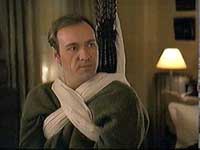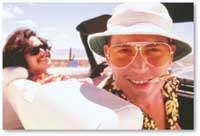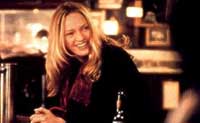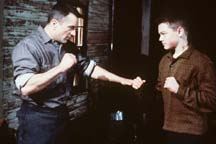
|
Top 50 Underappreciated Recent Films50) The Ref
--Before The Usual Suspects, before Se7en, before American Beauty, Kevin Spacey starred in this comedic gem with Judy Davis, Dennis Leary and one of the best all-around casts put together. Spacey and Davis play a bickering couple who are always at each other's throats and whose well of problems sinks deep into their past. Dennis Leary is a thief on the run who decides to hide out at their house after taking them hostage. Of course, the fit doesn't really hit the shan until the in-laws arrive and Leary has to pose as the couple's psychiatrist, Dr. Wong. The Ref is easily one of the funniest films around. It is well-written, exceptionally well-acted and superbly directed. The only surprising thing about including this movie included is that it means that we now have a Jerry Bruckheimer film on an Underappreciated List. (Walid Habboub/BOP) --Want a movie that celebrates Christmas and family values? Well, this ain't it. This 1994 film is reason enough to be a Denis Leary fan, let alone great performances by Judy Davis and Kevin Spacey. One of, if not the, best films Ted Demme ever made. From the beginning of the movie, you see that Gus (Leary) isn't a top-notch cat burglar, and Lloyd and Caroline (Spacey and Davis) aren't the happiest of couples. The dinner scene alone makes this movie. If you are a fan of sarcastic, biting humor, this one will not disappoint. Great performances and a super ending makes this one worth watching every holiday season. (Calvin Trager/BOP) 49) Fear and Loathing in Las Vegas
But if you revisit the first true piece of gonzo filmmaking, you'll discover a rich, detailed, and crazy head-trip of a film, completely devoid of any sensible ideas, but brimming with creativity, wit and the drugged-out intellectualism of Hunter S. Thompson. Numerous cameos abound, from Tobey Maguire, Cameron Diaz and Christina Ricci to the good Doctor himself. Watching a Terry Gilliam film is never an easy experience, and this may rank with his most difficult, but if you can let your mind get away from the usual cinematic constraints for 90 minutes, you'll find Fear and Loathing nothing less than interesting. (Les Winan/BOP) --This is a brilliantly realized vision of Hunter S. Thompson's legendary, chemically-fueled run through the Las Vegas jungle in the early '70s while on assignment for Rolling Stone. Director Terry Gilliam has an incredibly fascinating, fertile, restless creative mind, and somehow he has managed (only just) to tame his manic imagination and channel it into some beautiful, strange and funny films (Brazil, Time Bandits and The Fisher King being only a small sample). Thompson is very much like Gilliam in that he knows few boundaries, and if you try to make either of these two aware of any other boundaries, you can expect them to get very hostile. While Gilliam brings a very distinctive, recognizable touch to his films - one that may not lend itself so easily to Thompson's style - I can't think of any other director that would be as qualified to helm Fear and Loathing. Gilliam has had a lot of practice mapping out some very surreal landscapes and walking audiences through mental terrain that teeters very close to insanity. In other words, he's perfect for a Hunter Thompson film. And as for Depp's performance, I have never much enjoyed his work, but he shines in his portrayal of Thompson. The great Gonzo himself was convinced that the actor had channeled his very essence, and I gotta respect that. (Tad Roebuck/BOP) 48) Beautiful Girls
Timothy Hutton shines as Willie, a struggling musician who comes home to a broken family and has to wrestle with his attempt to age without having to grow up. He and all his old high-school buddies struggle with issues of finding love, a career and maturing. Willie's young next-door neighbor, Marty, is exquisitely played by a young Natalie Portman. When queried about her age, Marty accurately states, "Thirteen. But I have an old soul." Marty falls for our protagonist Willie, and while the pedophilic undertones of the relationship make it vaguely uncomfortable, there is a great chemistry between Hutton and Portman that comes across with every scene they have. Besides Hutton and Portman, the film is filled with notable names, such as Michael Rapaport, Rosie O'Donnell, Lauren Holly, Mira Sorvino, Uma Thurman, and Matt Dillon. Most every male on the verge of graduating from carefree childhood to accepting the mantle of adulthood has dealt with the issues that Beautiful Girls tackles. The film's characters and emotions resonate because they're so real, without having to pander to clichés. (Kyle Kunitake/BOP) 47) Safe
Carol's unidentifiable illness breeds fear, doubt and ultimately pain. Her husband and doctors do not understand. Her condition merely worsens. Director Todd Haynes' unspoken allegory for AIDS works as drama, satire, thriller, and social commentary. Haynes had his crew watch Kubrick's 2001 repeatedly, and he shoots and frames his images here with a similar sense of vastness, detachment and purpose. Haynes allows Carol to be overwhelmed in the image and he routinely imprisons her in the corner of the frame. Carol's environment literally and figuratively sickens her but more so, Haynes' implication is that suburbia and complacency are eroding Carol's soul. (Alex Hudson/BOP) --This film could be described as an extremely low-key thriller; nothing unusually dramatic happens in the movie, but there's a constant battle throughout for Julianne Moore's character's health, sanity and soul. She is the centerpiece of this film, appearing in nearly every scene and performing the seemingly contradictory feat of making a character with no personality interesting. As a vacuous upper-class housewife, Carol seems to have never thought about much more than where the new couch should go. One day, though, she starts to develop a series of allergies to seemingly everything around her. Though it starts off as a disease-of-the-week movie about environmental sickness, there's far more depth than that. Director Todd Haynes implicitly links Carol's empty lifestyle and lack of personality with her allergies; it's a sick soul, not a sick body. Discovering a retreat/commune in the desert designed for people with symptoms like hers, she leaves her husband and child to try to get well. Just when we think the film is about to turn into a single-minded bashing of Western and industrial society, Haynes has pulled another trick out; Carol's disease progresses further and the empty words of the smooth-talking guru of the camp offer little support. Carol retreats further into her illness and herself, and no level of safety is enough. Savage in its quiet dismissal of both sides of the argument, it has a carefully slow build as you come to realize just what Carol's problem truly is. For careful observers, the final ten minutes of the film will be as chilling and unsettling as any horror film. (Reagen Sulewski/BOP) 46) This Boy's Life
Whenever you wonder just why people have gone on about the star qualities of either Robert DeNiro or Leonardo DiCaprio, sit down, buckle yourself in, and prepare yourself for a very bumpy ride as you watch two pros go at it in This Boy's Life. Tobias Wolff's memoir about his early life in the late 1950s makes it clear that he (played by DiCaprio) was no angel; at the beginning of the film, he takes advantage of his mother and any situation available, and was obviously quite a rebellious handful and a stinker. But when his mother (who careens from town to town and bad situations) links up with and marries a macho bully named Dwight (DeNiro) to give Tobias a "strong father figure", it doesn't take a genius to figure out that she's invented a new circle of hell for the kid. Dwight is every kid's nightmare of a raging, bullying dad. He lies, he cheats, he steals, rapes and terrorizes, and he loathes Tobias's guts, partly because it's obvious that, under the delinquent façade, Tobias is a shining star intellectually, and that Dwight feels inadequate to the kid's sharp mind. So if he wants Tobias's opinion on anything, he'll beat it out of him. And does, often, taking great delight in being an insecure out-of-control control freak. DiCaprio's sneering attitude and looks play to this character; you realize that yeah, the kid's a mess, but nobody deserves this sort of life. And This Boy's Life (well realized by the leads and a fine script) circles around the question of what people make of their lives. Some are condemned to wallow in their shortsightedness and limited nature, like Dwight and the mother, and Tobias realizes that he's better than that. But getting there is a different matter. There's a gemlike scene about two-thirds of the way in where Tobias (who is scrabbling hard at a chance to get out of this hell) is hanging out with a few of the locals, drinking beer around a fire. The other boys are loudly dreaming about how they'll be making a mint with some factory job and driving around hot rods, and Tobias (dreaming of getting out and going to a far-away prep school) snaps back at them about how small-time and hopeless their dreams are, fearing to be trapped with them in a dirtball life. It's obvious why this movie didn't do any better; the story is no gentle childhood tale, and as little as we may like to admit it, there are a ton of similar stories out there. Doesn't make it easier to watch, though. But it's compelling, gripping stuff. (Jim Rittenhouse/BOP)
Click here to read selections 45-41.
|
Friday, January 30, 2026
© 2006 Box Office Prophets, a division of One Of Us, Inc.
 --When you consider how often a volatile stand-up comedian is shoe-horned into
a half-baked, poorly-conceived project (I'm looking your way, Chris Rock),
those times when everything comes together stand out in greater relief. Of
course, surrounding him with outstanding talent and providing a strong
screenplay just makes things that much better. Denis Leary, stand-up
extraordinaire and star of the dearly-departed sitcom "The Job", serves as
the blowtorch dropped into the powder keg of a dysfunctional family headed
by Kevin Spacey and Judy Davis. Hiding out from the local cops after a
heist gone wrong, Leary ends up spending Christmas Eve in the home of Spacey
and Davis, holding them hostage while the remaining threads of their
marriage come unraveled. As the family edges closer and closer to losing
all restraint, and Leary's rage fans the flames, the ultimate conclusion is
much more satisfying than it has any right to be. (David Meek/BOP)
--When you consider how often a volatile stand-up comedian is shoe-horned into
a half-baked, poorly-conceived project (I'm looking your way, Chris Rock),
those times when everything comes together stand out in greater relief. Of
course, surrounding him with outstanding talent and providing a strong
screenplay just makes things that much better. Denis Leary, stand-up
extraordinaire and star of the dearly-departed sitcom "The Job", serves as
the blowtorch dropped into the powder keg of a dysfunctional family headed
by Kevin Spacey and Judy Davis. Hiding out from the local cops after a
heist gone wrong, Leary ends up spending Christmas Eve in the home of Spacey
and Davis, holding them hostage while the remaining threads of their
marriage come unraveled. As the family edges closer and closer to losing
all restraint, and Leary's rage fans the flames, the ultimate conclusion is
much more satisfying than it has any right to be. (David Meek/BOP)
 --Terry Gilliam's faithful adaptation of the Hunter S. Thompson gonzo
journalism classic was widely reviled, and it's hard to blame the public.
Starring Johnny Depp and Benicio del Toro, Fear and Loathing in Las Vegas
was an absolutely accurate filmed version of the book. Of course, anyone
who'd read, and enjoyed, the book was enthralled to see something considered
so unfilmable laid out so majestically on screen. The presence of two of
America's most versatile, and least commercial, actors in the lead roles
didn't help matters.
--Terry Gilliam's faithful adaptation of the Hunter S. Thompson gonzo
journalism classic was widely reviled, and it's hard to blame the public.
Starring Johnny Depp and Benicio del Toro, Fear and Loathing in Las Vegas
was an absolutely accurate filmed version of the book. Of course, anyone
who'd read, and enjoyed, the book was enthralled to see something considered
so unfilmable laid out so majestically on screen. The presence of two of
America's most versatile, and least commercial, actors in the lead roles
didn't help matters.
 A group of 20-somethings' high school reunion is the catalyst for their
dealing with adulthood. Sounds trite, but a great cast and superb
performances make Beautiful Girls a truly memorable film.
A group of 20-somethings' high school reunion is the catalyst for their
dealing with adulthood. Sounds trite, but a great cast and superb
performances make Beautiful Girls a truly memorable film.
 --Carol (Julianne Moore) lives the American dream: Husband, home, happiness.
But the idealistic bliss of comfortable living slowly unravels. Carol, out
of the blue, develops an intensely negative physical reaction to certain
everyday products like detergent and perfume. Inexplicably, her environment
is poisoning her.
--Carol (Julianne Moore) lives the American dream: Husband, home, happiness.
But the idealistic bliss of comfortable living slowly unravels. Carol, out
of the blue, develops an intensely negative physical reaction to certain
everyday products like detergent and perfume. Inexplicably, her environment
is poisoning her.
 "You know, Mrs. Buchman, you need a license to buy a dog, to drive a car -
hell, you even need a license to catch a fish. But they'll let any
butt-reaming asshole be a father." -Keanu Reeves in PARENTHOOD
"You know, Mrs. Buchman, you need a license to buy a dog, to drive a car -
hell, you even need a license to catch a fish. But they'll let any
butt-reaming asshole be a father." -Keanu Reeves in PARENTHOOD